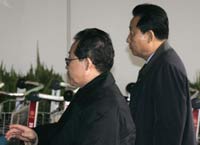Koreas to hold high-level reconciliation talks despite nuclear impasse
The two Koreas plan to hold a new round of high-level reconciliation talks this week despite the North's refusal to start dismantling its nuclear program and the South's apparent decision to hold back promised food aid to its impoverished neighbor.

The Cabinet-level meetings - scheduled to open Tuesday and run through Friday in Seoul - could plunge quickly into a stalemate if North Korea protests South Korea's move to delay rice shipments until after the North acts on a February pledge to shut down its nuclear reactor.
North Korea angrily pulled out of similar talks last year when Seoul rebuffed its demand for rice aid following the North's test of a series of missiles in July. That soured relations, and ties were further damaged when North Korea conducted its first nuclear test in October.
The reconciliation process got back on track after North Korea promised in February to shut down its Yongbyon reactor in exchange for energy aid and political concessions. But North Korea has yet to honor the pledge, citing a banking dispute with the United States.
South Korea agreed at economic talks last month to provide 400,000 tons of rice to the communist nation, with the delivery beginning in late May. But Seoul has not bought any of the rice or arranged a ship to transport it in an apparent attempt to delay the shipment until after North Korea fulfills its nuclear obligations.
Seoul officials said they stressed to their North Korean counterparts at last month's economic talks that the delivery plan could change depending on progress in the nuclear issue.
"The delivery of the first shipment is likely to be delayed because of various circumstances," a Unification Ministry official said on Monday, alluding to the nuclear issue. He spoke on condition of anonymity, citing the issue's sensitivity.
A pro-North Korea newspaper in Tokyo blasted the South on Monday for tying food aid to the nuclear issue.
"It is no different from creating an obstacle" to inter-Korean cooperation, the Chosun Sinbo newspaper said. The paper is run by the association of North Korean residents in Japan and is considered a propaganda tool of the government in Pyongyang.
South Korea hopes to use this week's meetings to seek the North's consent to formally reopen cross-border rail lines.
The two sides conducted a test run of trains on two restored tracks earlier this month, the first time trains have crossed their heavily armed border since rail links were cut early in the 1950-53 Korean War.
One of the two lines, running on the western side of the peninsula, is linked to a South Korean-built industrial park in the North Korean border city of Kaesong, and the other on the peninsula's eastern side is linked to a South Korean-built tourist resort at the North's Diamond Mountain.
Seoul believes regular train service on those lines would significantly boost the two exchange projects, among the most prominent symbols of detente since the former enemies held the only summit of their leaders in 2000.
Analysts say North Korea is likely to demand economic or political concessions for beginning the rail service.
Other topics the South plans to raise include ways to reduce military tension on the peninsula, humanitarian issues such as separated families, and ways to promote economic exchanges, the Unification Ministry official said.
The Cabinet-level talks are the highest-level regular dialogue channel between the two sides. This week's talks are the 21st round since the 2000 summit. The last round was held in Pyongyang in February-March.
The armistice that ended the Korean War has not been replaced by a peace treaty, leaving the two Koreas still technically at war.
Subscribe to Pravda.Ru Telegram channel, Facebook, RSS!


